Central KnowledgeBase (CKB)
General
Does Alma support a Central KnowledgeBase?
Alma includes a Central KnowledgeBase. The Central KnowledgeBase (CKB) describes vendor offerings for electronic resources and is maintained by Ex Libris. By integrating the CKB into the data services environment (the Community Zone), Alma allows libraries to eliminate the need to manually synchronize records for electronic resources into the local catalog. When a complete or partial package is activated in the CKB, the individual titles in that package are immediately available in the library’s inventory.
The CKB is tightly integrated with Alma acquisitions workflows and electronic management workflows:
The institution can search the CKB for electronic resources of different types, choosing resources as part of the selection workflow, and/or initiating a purchasing workflow for the selected resources.
- An institution can also activate CKB electronic resources using an activation wizard. The Central Knowledge Base electronic resources details can be overwritten with an institution’s local information.
- Since the CKB is maintained by Ex Libris, any CKB change related to the electronic resources used by the institution will be reflected in the institutional inventory, keeping the institution’s electronic resources up to date, and taking into account any localization of the electronic resource.
- The information in Alma’s CKB also provides the data needed for Alma’s link resolution functionality. Electronic resources linked to the CKB electronic resources can be resolved just as any other electronic resource, using the embedded OpenURL link resolver.
The CKB is updated on a weekly basis.
The Community Zone Updates Task List page in Alma displays these updates that were made to the Institution Zone (IZ) during updates from the Community Zone (CZ). These changes are specific to the institution and may include modifications to bibliographic records, as well as changes to holdings, availability, security requirements, and parser parameters.
Because Alma was planned as a unified system, thereby integrating Electronic Resource Management, Acquisitions and Link Resolution, there is no need to load additional descriptive records when acquiring electronic resources based on the CKB. In other words, all electronic resources managed in the CKB will contain a descriptive record linked to locally activated resources. As policy, Ex Libris attempts to provide as full a description as possible for the CKB resources; for example, by enriching the records based on CONSER information (for e-journals). This makes any additional loading of full descriptive records into the local catalog unnecessary.
Does the KnowledgeBase allow for sharing of data with other libraries in the community?
Alma’s Community Zone includes a Community Catalog of bibliographic records. This catalog serves as a source of descriptive records for all Alma libraries, and allows libraries to work directly in a collaborative metadata management environment. Libraries can attach holdings directly to a community record, copy community records to the local catalog, or edit and update community records.
A library can link its inventory records to the metadata records in the Community Zone, eliminating the need to download these records to the local catalog.
When linking to a shared version of a record, the following characteristics are true:
-
Copying a record from a shared catalog to the local catalog is supported, but not required. By linking inventory directly to the shared record, they will immediately benefit from any central improvement to the record.
-
Searching the local inventory will retrieve records in use by the local institution, which will automatically include relevant records stored in the local and shared catalogs.
-
When publishing or exporting records (e.g., when synchronizing records with an external database), member libraries will export their whole inventory, which may include records from the local and shared catalogs.
The image below shows a search of the local institution’s inventory that includes both local records and community records (in this case, results #1-2), as identified by the Community Catalog icon next to the title. A similar search of the Community will identify any records that are in use by the local institution.
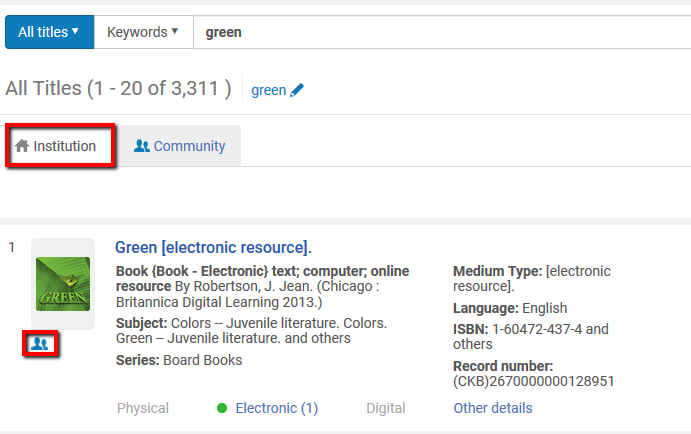
Does the KnowledgeBase include all types of metadata?
Alma includes an extensive and rich Central Knowledge Base (CKB) utilized in an integrated way as part of different workflows. The CKB is maintained by Ex Libris, but resources can be localized to reflect institution-specific information, such as administrative/access information, coverage information for electronic journal titles, public notes etc. This Knowledge Base is part of the Community Zone and is shared by all members of the Alma community.
Since the CKB is maintained by Ex Libris, any CKB change related to the electronic resources used by the institution will be reflected in the institutional inventory, keeping the institution’s electronic resources up to date, and taking into account any localization of the electronic resource. The Alma CKB includes the following types of electronic resources from major scholarly publishers:
-
object portfolios (“portfolio” = titles within packages)
-
full text object portfolios
-
eBooks portfolios
-
bib-records (objects)
-
peer reviewed journals
-
packages
-
full text packages
-
selective packages (targets)
-
aggregator packages (targets)
The information in Alma’s CKB also provides the data needed for Alma’s link resolution functionality.
It is possible to maintain local titles that do not appear in the Knowledge Base as can be seen in the following screen capture:
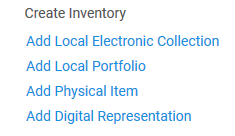
How comprehensive is the CKB?
The Alma CKB describes collections of electronic resources offered by a wide variety of vendors, including the titles that are part of that package and linking information for individual titles and articles in those packages. The sources of the metadata come from the vendors providing the electronic resources. Ex Libris continually works to improve and add content to the Knowledge Base. Customers may request that resources be added to the Knowledge Base, and we endeavor to add them as quickly as possible.
How frequently is the KnowledgeBase updated?
The Central KnowledgeBase is updated on a weekly basis by a dedicated team at Ex Libris. High-quality data is loaded regularly and updated frequently from all major vendors, platforms, and publishers.
Users can search their own institution, the consortium (the Network Zone) and the Community Zone shared catalog (the Alma Community Zone incorporates the KnowledgeBase, a Community Bibliographic Catalog and Global Authority Files).
Does Alma support reporting KB updates?
The Community Zone Updates Task List page in Alma displays these updates that were made to the Institutional Zone (IZ) during updates from the Community Zone (CZ). These changes are specific to the institution and may include modifications to bibliographic records, as well as changes to holdings, availability, security requirements, and parser parameters.
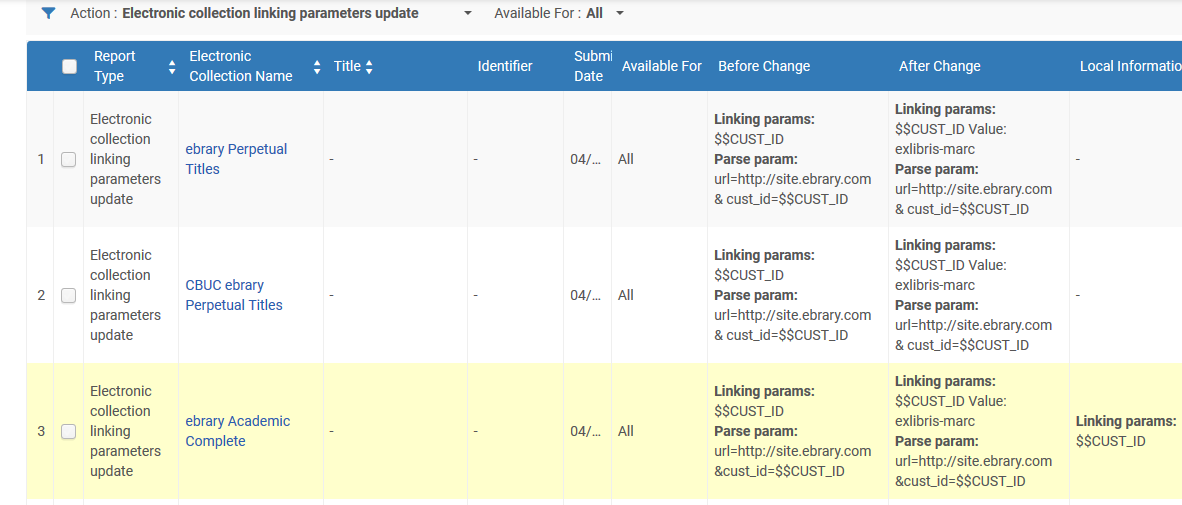
The Community Zone Updates Task List page > Review tab by default displays the following columns of information:
- Report Type
- Electronic Collection Name – When available, this column provides a link for the resource to the appropriate Alma editor.
- Title – When available, this column provides a link for the resource to the Electronic Portfolio Editor.
- Identifier
- Submit Date
- Before Change/After Change – The information in the Before Change and After Change columns represents the changes made globally as part of the Community Zone update job.
- Local Information – The information in the Local Information column identifies the local override information maintained by the library.
The report type filter provides the following options:
- All
- Electronic collection deleted
- Electronic collection linking parameters update
- Electronic collection base URL updated
- Portfolio coverage update
- Portfolio deleted from non-auto-active package
- Electronic collection service deleted
In addition, weekly update logs regarding changes made in the Central Knowledge Base (CKB) are posted on the Ex Libris Knowledge Center and can be found here (https://knowledge.exlibrisgroup.com/Alma/Release_Notes/010_2018/14_Weekly_CKB_Updates).
What is the user community involvement in the development of the KnowledgeBase?
The Alma CKB describes collections of electronic resources offered by a wide variety of vendors, including the titles that are part of that package and linking information for individual titles and articles in those packages. The sources of the metadata come from the vendors providing the electronic resources. Ex Libris continually works to improve and add content to the Knowledge Base. Customers may request that resources be added to the Knowledge Base, and we endeavor to add them as quickly as possible. Customers request new resources to be added to the KnowledgeBase via Salesforce. In Salesforce, they can also view existing requests from other customers, and promote them.
The Ex Libris Idea Exchange site - http://ideas.exlibrisgroup.com/forums/574345-content allows for suggesting ideas for suggesting collections and data to be added to the KnowledgeBase.
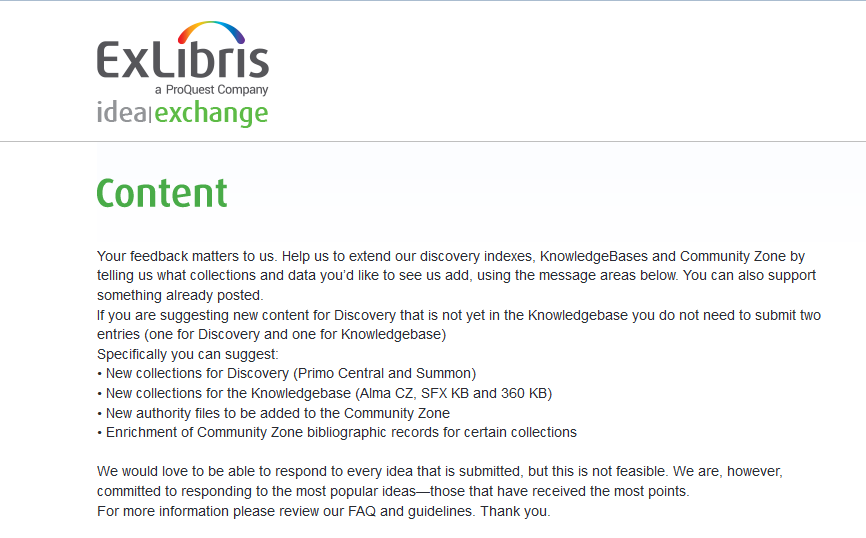
Additionally, ELUNA, the Ex Libris Users of North America, and IGeLU, the International Group of Ex Libris Users, are the groups for users of all Ex Libris products. ELUNA and IGeLU facilitate communication between product users and Ex Libris, and represents user needs to Ex Libris. Both groups meet once a year at, or near, a customer site, and it maintains a number of product-specific listservs as well as a web site.
The groups' goals are to:
- Serve as an educational group for users of Ex Libris’ products.
- Facilitate communication between product users and Ex Libris; especially, represent user needs to Ex Libris by:
- Providing feedback on general company directions.
- Assisting the company in identifying needed major enhancements to existing products and new products.
- Setting priorities for the company’s product enhancements.
- Assisting the company in setting general priorities for meeting other user needs.
- Working with the company on the development of functional and technical specifications for both small and large-scale development; reviewing, testing, and providing feedback on development work.
- Facilitate communication among users of Ex Libris’ products and provide educational opportunities for users of Ex Libris’ products by:
- Organizing user conferences.
- Maintaining e-mail discussion lists for the entire membership and appropriate subsets of the membership.
- Maintaining a Web site for the organization.
- Providing a means for sharing locally developed documentation and reports.
- Providing forums for sharing best practices, e.g., workshops presented by users.
- Facilitating formation of interest groups for users that share similar concerns.
- The groups maintain a constitution and by-laws, and elect a steering committee who represent the organization’s membership in meetings with Ex Libris, particularly those that involve general communication with users, overall company direction, large-scale product enhancement, and integration of product functionality.
Localization
Can CKB electronic resources be localized?
CKB electronic resources can be localized to reflect institution-specific information, such as administrative/access information, coverage information for electronic journal titles, public notes, etc.
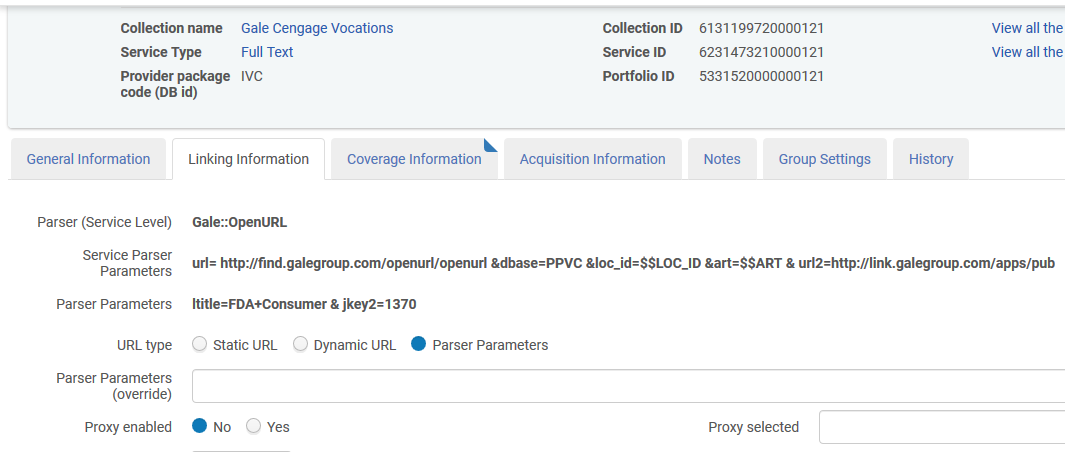
Note, for instance, how the library can override parser information, define a proxy, etc.
Can local collections be added?
Staff can add local electronic collection. The workflow includes adding services, which describe the access to the collection's portfolios.
To add a local electronic collection:
On the Electronic Collection Editor page (Resources > Create Inventory > Add Local Electronic Collection), enter the basic collection information:

Once this information has been entered and saved, the Electronic Service Editor page appears with the Activation Information tab pre-selected:
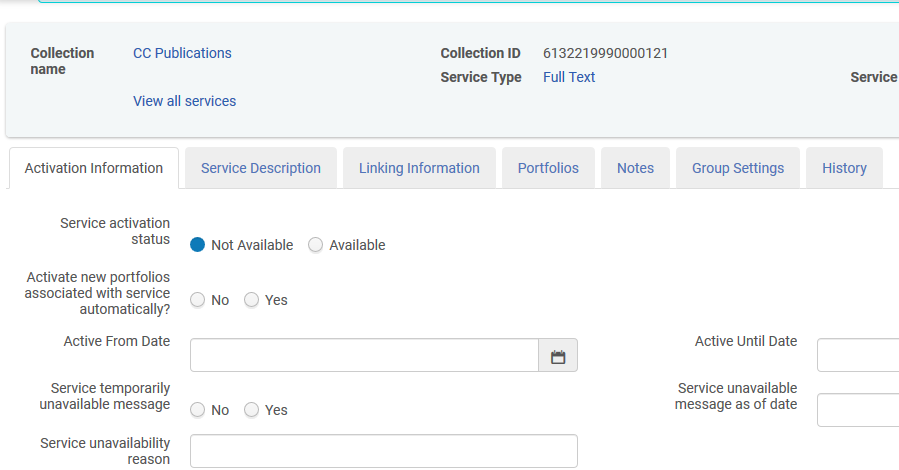
Additional information may be defined on the Linking Information tab, Portfolios tab, etc.
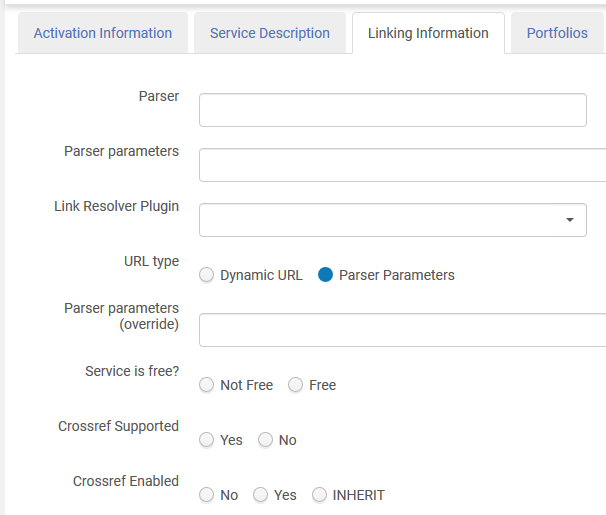
Portfolios can be loaded from an excel file or added singly, and then activated:

ProQuest Knowledgebase (New KB)
What is the ProQuest Knowledgebase and how does it relate to Alma?
The ProQuest Knowledgebase (also called the “New KB”) was originally designed to be the unified metadata repository that would help realize the Intota™ vision of a next-generation library management platform.
ProQuest Workflows Solutions designed a relational data model to bring together the metadata in the Serials Solutions E-Resource Knowledgebase (now called the “360 KB”) with Ulrich’s™ authoritative serials information and tens of millions of authoritative MARC Bibliographic records for ebooks and ejournals. The Intota vision of a “New KB” included building on these foundational ProQuest assets to create a knowledgebase capable of increased scope, scale, systems, and services (such as APIs) to fully support electronic and digital resources.
When Ex Libris and ProQuest came together in December 2015, Ex Libris identified the integration of ProQuest Knowledgebase metadata into the Alma® unified resource management system as a key business initiative to incorporate the Intota vision into Alma.
Will the ProQuest Knowledgebase be further developed by Ex Libris?
Yes, not as a standalone knowledgebase but as part of the continued development and enhancement of the Alma library services platform.
Technically, the ProQuest Knowledgebase was designed to support the Intota vision of a next-generation library management platform. Alma is a next-generation library services platform with its own scalable infrastructure, systems, and APIs. Fortunately, Ex Libris is able to use the foundational ProQuest Knowledgebase metadata in Alma without the need to restructure or redesign Alma. The Alma platform also allows the knowledgebase to support new content types and digital resources.
The integration of the ProQuest Knowledgebase and Alma, together with the harmonization of Ex Libris Content Operations processes and tools, allows for the realization of a true next-generation knowledgebase in Alma capable of supporting the most effective resource management, resource discovery, and analytics available to libraries.
How is Ex Libris using ProQuest Knowledgebase metadata in Alma?
Comprehensive ProQuest Knowledgebase metadata about e-resources is already a valuable contribution to the Alma Community Zone, which is the resource repository of authority records, bibliographic metadata, and electronic collections information that is shared by all Alma customers. Among the key benefits to Alma, the ProQuest Knowledgebase metadata contributes:
-
Additional electronic collections from thousands of providers
-
Broader coverage of Open Access resources
-
Bibliographic record enrichment
-
Ease of customer migrations to Alma from the 360 Services and Intota
When did the integration work begin?
Integration development work began in March 2016.
What is the status of the integration of ProQuest Knowledgebase metadata into Alma?
Working together, Ex Libris teams in Seattle and Jerusalem have already begun to integrate ProQuest Knowledgebase metadata into Alma. Specifically:
-
August 2016: Electronic full-text collections present in the ProQuest Knowledgebase that were not already available in the Alma knowledgebase are identified as future additions to the Community Zone. Content Operations and Data Services begins a multi-phase project to incorporate and harmonize identifiers between these two sources, to enable future Community Zone enrichment. An initial 46 full-text collections are added.
-
October 2016: More than 1.5 million ebook MARC records are uploaded into the Community Zone from the ProQuest Knowledgebase as part of the ongoing effort to enrich the metadata quality of ebook bibliographic records available for resource management.
-
February 2017: Approximately 9,000 electronic collections with descriptive records and URL access to the native interfaces, representing databases with no portfolio lists, are added from the 360 KB component of the ProQuest Knowledgebase. Having these “zero-title” e-collections as part of the Community Zone eliminates the need to create local e-collections representing these databases as part of the acquisitions process. As with any other e-collections, these e-collections can be activated and made publicly available in your discovery system.
-
May 2017: More than 60 additional electronic collections from the 360 KB component of the ProQuest Knowledgebase are added to Alma to increase the scope of available Community Zone collections and support the integration of Summon and Alma.
What further integration of the ProQuest Knowledgebase in Alma is Ex Libris considering?
Ex Libris continues to focus on enhancing the scope and depth of Alma’s knowledgebase with additional metadata for electronic collections. Metadata from the ProQuest Knowledgebase will remain an important source of information about e-collections and their providers, and will be used to enrich resource information in Alma Overlap Analysis and Alma Analytics.
In addition, title-level and article-level linking syntaxes for e-collections in the 360 KB will be added to Alma to enhance resource linking.
Ulrich’s metadata is used in Summon, the 360 Core E-Journal Portal, and 360 Link. As of March 2016, the peer-reviewed designation for Ulrich’s serials is also used in SFX and Primo. Integration of Ulrich’s data in Alma is also possible.
How does integrating the ProQuest Knowledgebase help Intota and 360 Services customers move to Alma?
The metadata in the ProQuest Knowledgebase includes the unique identifiers used in the 360 KB. When these identifiers are added to electronic collections in the Alma knowledgebase, they allow a library’s electronic holdings data to be more easily identified and migrated into Alma from the 360 Client Center and Intota.
Does the ProQuest Knowledgebase replace the 360 KB or the SFX KB?
No. The 360 KB is still the centrally-managed metadata that powers the 360 Services and Intota. The SFX KnowledgeBase is still the primary source of metadata for SFX.
Total views:
10059
